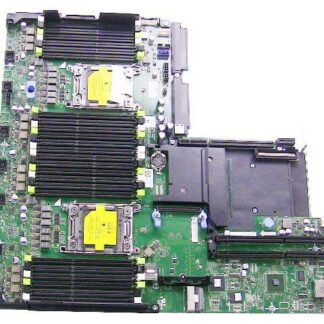Description
Product Overview of the Dell 225-3201 Poweredge T320 System Board
The Dell 225-3201 Poweredge T320 System Board is a crucial component within the Dell Poweredge T320 server. It serves as the main circuit board that houses various essential hardware components necessary for the server’s operation. Understanding the intricacies of this system board is vital for those involved in server maintenance, troubleshooting, or upgrading.
Importance of the System Board
The system board, or the server board, is the backbone of any computer system, including servers like the Dell Poweredge T320. It provides the physical and electrical connections between various hardware components, allowing them to communicate and function together seamlessly.
Functionality and Performance
The Dell 225-3201 Poweredge T320 System Board plays a crucial role in ensuring the overall functionality and performance of the Poweredge T320 server. Its design and features contribute to the server’s reliability, scalability, and ease of maintenance.
Compatibility and Interoperability
One of the key considerations when dealing with system boards is compatibility with other hardware components. The Dell 225-3201 Poweredge T320 System Board is designed to work seamlessly with compatible processors, memory modules, storage devices, and expansion cards, providing users with a stable and efficient computing platform.
Troubleshooting Common Issues
Like any complex electronic component, the Dell 225-3201 Poweredge T320 System Board may encounter various issues during its lifespan. These can range from minor connectivity issues to more serious hardware failures. Common troubleshooting steps include checking for loose connections, testing individual components, updating firmware and drivers, and consulting manufacturer documentation and online support resources for guidance.
Upgrading the System Board
As technology evolves and new hardware components become available, there may come a time when upgrading the Dell 225-3201 Poweredge T320 System Board becomes necessary or desirable. Whether taking advantage of improved performance, increased capacity, or enhanced features, upgrading the system board requires careful planning, compatibility analysis, and execution to ensure a smooth transition without disrupting server operations.
Key Features of the Dell 225-3201Form Factor
The Dell 225-3201 Poweredge T320 System Board features a standard ATX form factor, ensuring compatibility with the T320 server’s chassis and other components.
Processor Support
This system board supports a range of Intel Xeon E5-2400 series processors, offering users flexibility in choosing the appropriate CPU based on their performance and budget requirements.
Memory Slots
It comes equipped with multiple DDR3 memory slots, allowing for installing ECC (Error-Correcting Code) registered DIMMs (Dual In-line Memory Modules) to enhance system stability and reliability.
Expansion Slots
The Dell 225-3201 Poweredge T320 System Board includes PCI Express (PCIe) expansion slots to accommodate additional peripherals such as RAID controllers, network interface cards (NICs), and graphics cards, depending on the server’s configuration and usage scenario.
Integrated Components
It integrates various components essential for server operation, including onboard SATA (Serial Advanced Technology Attachment) connectors for connecting storage drives, USB (Universal Serial Bus) ports for peripheral devices, and Ethernet ports for network connectivity.
General Information About this Dell 225-3201
- Manufacturer: Dell
- Model Number or SKU# 225-3201
- Product Type: Poweredge
- Product Name: System Board
In summary, the Dell 225-3201 Poweredge T320 System Board is a critical component of the Dell Poweredge T320 server, providing the foundation for its functionality, reliability, and performance. Understanding its features, compatibility, installation procedures, maintenance requirements, and troubleshooting methods is essential for maximizing the server’s uptime and efficiency. By taking a proactive approach to system board management, server administrators can help ensure the smooth operation of their IT infrastructure and the uninterrupted delivery of services to end-users.










